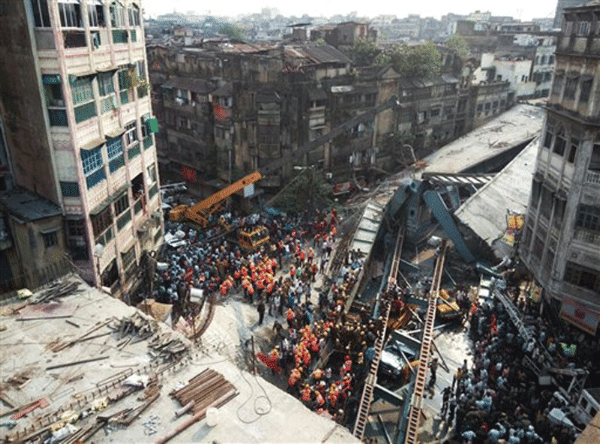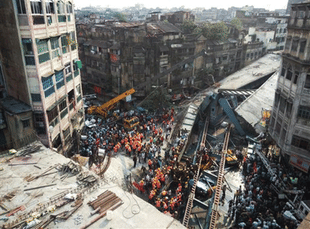Politics
This Is How Barkati & Co Swing Poll Results In Bengal
Jaideep Mazumdar
May 13, 2017, 05:12 PM | Updated 05:12 PM IST
Save & read from anywhere!
Bookmark stories for easy access on any device or the Swarajya app.


Last year, as poll fever was building up in West Bengal, the ruling Trinamool Congress was dealt a blow. A flyover in the northern part of the capital city came crashing down, killing 26 people, injuring over 80 and leaving a dozen-odd maimed for life. It was revealed that the poor quality of construction materials, a faulty design and hasty construction was responsible for the tragedy.
The 2.2km long flyover was in the Jorasanko assembly constituency, which had been represented by the Trinamool Congress since 2001. The Trinamool Congress, under whose rule extortionist construction syndicates have flourished in Bengal, was being blamed for the incident. And within days of the flyover collapse, a local newspaper published a damning report exposing the involvement of a close relative of Jorasanko’s Trinamool MLA Smita Bakshi in the accident. A cousin of Smita’s husband, Sanjay Bakshi (a close associate of Mamata who has had many brushes with the law), it was revealed, was a sub-contractor in the ill-fated project.
Such revelations, and the poor reputation of the Bakshis, who allegedly had a finger in all construction works in the area and treated Jorasanko as their personal fief, was thought to have sealed the Trinamool’s fate in the constituency, which is famous for the Jorasanko Thakurbari, the ancestral home of the Tagore family, in the area. The state was going to the polls in April-May 2016 and with memories of the flyover still fresh in voters’ minds, the Trinamool had little hope of retaining the prestigious seat.
More so since the Bharatiya Janata Party (BJP) candidate, Rahul Sinha (former state president of the party), was putting up a tough fight. Mamata herself told her aides that there was little hope of Bakshi, who was fielded for the third time from the constituency, retaining the seat. Sinha’s street corner meetings and door-to-door campaigns were evoking a favourable response and it looked like he would wrest the seat from the Trinamool.
Jorasanko has 29 per cent Muslims, while the rest are Hindus with only a minuscule percentage of Buddhists and Jains. Most of the voters are non-Bengalis and belong to the trading class. Thus, this was thought to be a strong constituency for the BJP; the non-Bengali Hindu trading class was thought to form the backbone of the BJP’s support in the state. In the 2011 assembly polls, the BJP’s Meena Devi Purohit got more than 15 per cent of the votes and came third after the CPI(M) candidate, who got about 23 per cent of the votes. Of the eleven wards of the Kolkata Municipal Corporation in Jorasanko constituency, Muslims are in a simple majority in only three wards.
But urban development minister Firad Hakim (who infamously described his constituency to a visiting Pakistani journalist as a ‘mini-Pakistan’), a close aide of Mamata and her pointsman for liaising with Bengal’s mullahs, got into the act. Hakim held a series of meetings with Barkati and other Muslim clerics. Two weeks before the polls, Barkati issued decrees asking Muslims in Bengal, and Jorasanko in particular (many Muslims from that area attend Friday prayers at the Tipu Sultan masjid where Barkati is the Shahi Imam), to vote for the Trinamool.
Barkati and clerics of local mosques held meetings with leaders of the local Muslim community. At one such meeting held eight days before the day of polling, Barkati told some Muslim businessmen of the area to ensure that all votes of the community go to Bakshi. “Forget all the corruption she (Smita Bakshi) and her family are accused of and all their wrong-doings. Corruption has to be ignored to defeat the BJP. Muslims have to vote as one,” Barkati reportedly exhorted them.
Barkati followed up his decree with blandishments and threats. He and at least three other local maulanas issued ‘firmans’ stating that it would be the ‘holy duty’ of the Muslims to vote for the Trinamool. They also warned that Islam would be in danger if they voted for the BJP. Mamata herself followed up after these developments by holding a couple of public meetings at Jorasanko where she told her largely Muslim audience that while she would ensure that the Bakshis “behave themselves” from then on and work for the constituency’s development, it was far more important to “defeat communal forces”. Barkati and the maulanas promised rewards in the form of government benefits and contracts to influential Muslims in Jorasanko.
While ensuring that it got all Muslim votes, the Trinamool also ensured that Hindu votes would be divided. Thus, it got the Rashtriya Janata Dal (RJD) to prop a candidate in Jorasanko. It is learnt that Mamata herself worked the lines with Patna and requested RJD supremo Lalu Yadav for help; the latter willingly obliged. The RJD’s Avinash Kumar Agarwal, a political greenhorn no one had heard of till then, got 15,639 votes, thus ensuring that the votes of the Hindi-speaking people got divided and Rahul Sinha lost. The rest of the Hindu votes got divided between five Independent candidates, the Bahujan Samaj Party, the SUCI and the Janata Dal (Secular). The Trinamool is learnt to have propped up three Independent candidates to ensure further division of Hindu votes.
This polarisation of Muslim votes ultimately resulted in Bakshi winning Jorasanko, but by a much reduced margin. Her victory margin in 2011 was a handsome 31,509; it dwindled to 6,290 in 2016. Sinha polled 38,476 votes against Bakshi’s 44,766. A ward-wise analysis shows that 87 per cent of the votes polled in all polling stations of the three Muslim-majority wards went to Bakshi. The turnout among Muslim voters (thanks to Muslim clerics’ exhortation to them to ensure that all of them vote) was also a very high 94 per cent, as compared to the state average of 81 per cent.
This is how the Trinamool won Jorasanko in 2016. And this formula was replicated all over the state. Muslim clerics, in reality, scripted the Trinamool’s victory. No wonder, then, that the Trinamool is hostage to the likes of Barkati.
Also Read: This Malignant Maulana Is Not Mad, He Is Machiavellian
Jaideep Mazumdar is an associate editor at Swarajya.





